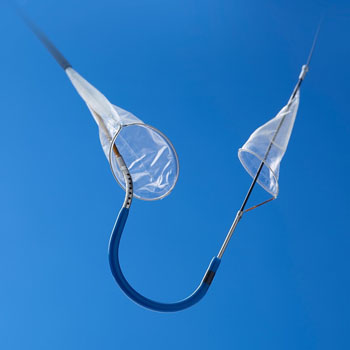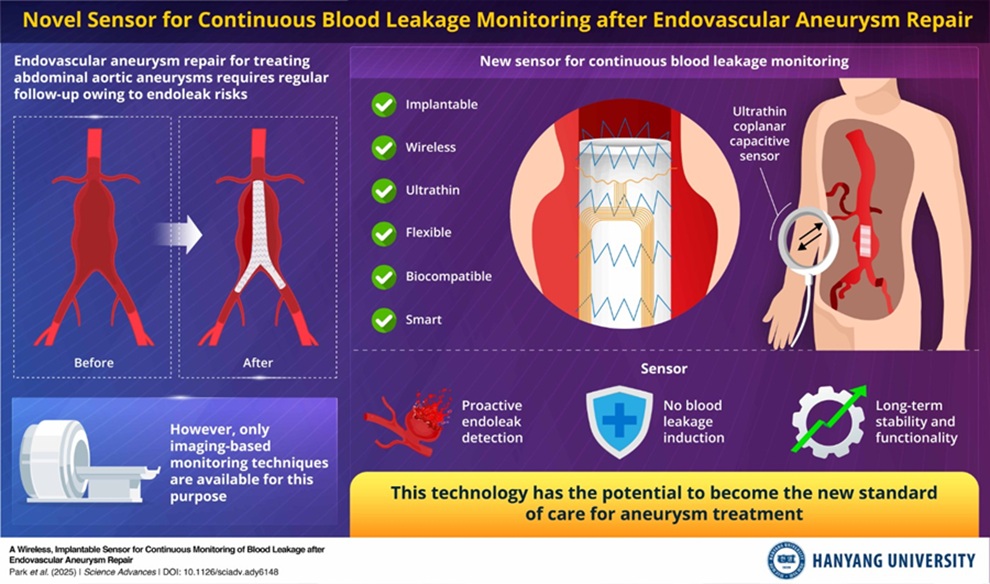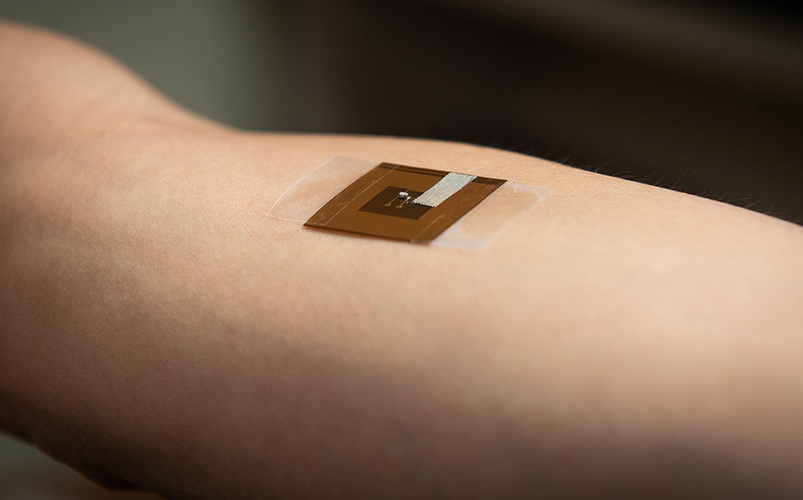Endovascular Filter Device Helps Prevent Periprocedural Stroke
|
By HospiMedica International staff writers Posted on 29 Aug 2016 |

Image: The Sentinel Cerebral Protection (SCP) device (Photo courtesy of Claret Medical).
A novel device provides cerebral protection during endovascular procedures such as transcatheter aortic valve replacement (TAVR).
The Sentinel Cerebral Protection (SCP) device consists of a catheter with deployable proximal and distal filters, an articulating sheath, and an integral handle assembly. Prior to the endovascular procedure, the SCP delivers a proximal embolic filter to the brachiocephalic artery, and a distal embolic filter to the left common carotid artery. Delivery is facilitated by the articulating sheath, which allows the curvature of the device to be adjusted for anatomic variations of the aortic arch, and by radiopaque markers that enable visualization under fluoroscopy during placement.
The filters collect debris released during the procedure, such as valve tissue, calcification, thrombii, or other material, and prevent it from traveling to the brain. At the completion of the procedure, the filters and collected debris are recaptured into the 6 French-compatible catheter and subsequently removed. The Sentinel CPS is a product of Claret Medical (Santa Rosa, CA, USA), and is available in one universal size that adjusts to the majority of vascular anatomies.
“Any occurrence of stroke is one too many, and results from this clinical trial may give us the evidence needed to make cerebral protection a standard of care during TAVR, as it is in carotid artery stenting,” said Samir Kapadia, MD, of the Cleveland Clinic (CC, OH, USA) cardiac catheterization laboratories, who participated in the clinical trial of the device. “By both capturing and removing embolic debris released during TAVR, the Sentinel CPS may offer a unique neuroprotective benefit.”
New ischemic brain lesions, or “silent” infarcts, occur in more than 90% of TAVR and other endovascular procedures, according to recent research. These ischemic lesions are associated with adverse neurologic and cognitive consequences, as well as dementia, and have also been shown to increase the risk of stroke by two to four times.
Related Links:
Claret Medical
Cleveland Clinic
The Sentinel Cerebral Protection (SCP) device consists of a catheter with deployable proximal and distal filters, an articulating sheath, and an integral handle assembly. Prior to the endovascular procedure, the SCP delivers a proximal embolic filter to the brachiocephalic artery, and a distal embolic filter to the left common carotid artery. Delivery is facilitated by the articulating sheath, which allows the curvature of the device to be adjusted for anatomic variations of the aortic arch, and by radiopaque markers that enable visualization under fluoroscopy during placement.
The filters collect debris released during the procedure, such as valve tissue, calcification, thrombii, or other material, and prevent it from traveling to the brain. At the completion of the procedure, the filters and collected debris are recaptured into the 6 French-compatible catheter and subsequently removed. The Sentinel CPS is a product of Claret Medical (Santa Rosa, CA, USA), and is available in one universal size that adjusts to the majority of vascular anatomies.
“Any occurrence of stroke is one too many, and results from this clinical trial may give us the evidence needed to make cerebral protection a standard of care during TAVR, as it is in carotid artery stenting,” said Samir Kapadia, MD, of the Cleveland Clinic (CC, OH, USA) cardiac catheterization laboratories, who participated in the clinical trial of the device. “By both capturing and removing embolic debris released during TAVR, the Sentinel CPS may offer a unique neuroprotective benefit.”
New ischemic brain lesions, or “silent” infarcts, occur in more than 90% of TAVR and other endovascular procedures, according to recent research. These ischemic lesions are associated with adverse neurologic and cognitive consequences, as well as dementia, and have also been shown to increase the risk of stroke by two to four times.
Related Links:
Claret Medical
Cleveland Clinic
Latest Surgical Techniques News
- Robotic Assistant Delivers Ultra-Precision Injections with Rapid Setup Times
- Minimally Invasive Endoscopic Surgery Improves Severe Stroke Outcomes
- Novel Glue Prevents Complications After Breast Cancer Surgery
- Breakthrough Brain Implant Enables Safer and More Precise Drug Delivery
- Bioadhesive Sponge Stops Uncontrolled Internal Bleeding During Surgery
- Revolutionary Nano Bone Material to Accelerate Surgery and Healing
- Superior Orthopedic Implants Combat Infections and Quicken Healing After Surgery
- Laser-Based Technique Eliminates Pancreatic Tumors While Protecting Healthy Tissue
- Surgical Treatment of Severe Carotid Artery Stenosis Benefits Blood-Brain Barrier
- Revolutionary Reusable Duodenoscope Introduces 68-Minute Sterilization
- World's First Transcatheter Smart Implant Monitors and Treats Congestion in Heart Failure
- Hybrid Endoscope Marks Breakthrough in Surgical Visualization
- Robot-Assisted Bronchoscope Diagnoses Tiniest and Hardest to Reach Lung Tumors
- Diamond-Titanium Device Paves Way for Smart Implants that Warn of Disease Progression
- 3D Printable Bio-Active Glass Could Serve as Bone Replacement Material
- Spider-Inspired Magnetic Soft Robots to Perform Minimally Invasive GI Tract Procedures
Channels
Critical Care
view channel
Ingestible Capsule Monitors Intestinal Inflammation
Acute mesenteric ischemia—a life-threatening condition caused by blocked blood flow to the intestines—remains difficult to diagnose early because its symptoms often mimic common digestive problems.... Read more
Wireless Implantable Sensor Enables Continuous Endoleak Monitoring
Endovascular aneurysm repair (EVAR) is a life-saving, minimally invasive treatment for abdominal aortic aneurysms—balloon-like bulges in the aorta that can rupture with fatal consequences.... Read more
Wearable Patch for Early Skin Cancer Detection to Reduce Unnecessary Biopsies
Skin cancer remains one of the most dangerous and common cancers worldwide, with early detection crucial for improving survival rates. Traditional diagnostic methods—visual inspections, imaging, and biopsies—can... Read morePatient Care
view channel
Revolutionary Automatic IV-Line Flushing Device to Enhance Infusion Care
More than 80% of in-hospital patients receive intravenous (IV) therapy. Every dose of IV medicine delivered in a small volume (<250 mL) infusion bag should be followed by subsequent flushing to ensure... Read more
VR Training Tool Combats Contamination of Portable Medical Equipment
Healthcare-associated infections (HAIs) impact one in every 31 patients, cause nearly 100,000 deaths each year, and cost USD 28.4 billion in direct medical expenses. Notably, up to 75% of these infections... Read more
Portable Biosensor Platform to Reduce Hospital-Acquired Infections
Approximately 4 million patients in the European Union acquire healthcare-associated infections (HAIs) or nosocomial infections each year, with around 37,000 deaths directly resulting from these infections,... Read moreFirst-Of-Its-Kind Portable Germicidal Light Technology Disinfects High-Touch Clinical Surfaces in Seconds
Reducing healthcare-acquired infections (HAIs) remains a pressing issue within global healthcare systems. In the United States alone, 1.7 million patients contract HAIs annually, leading to approximately... Read moreHealth IT
view channel
Printable Molecule-Selective Nanoparticles Enable Mass Production of Wearable Biosensors
The future of medicine is likely to focus on the personalization of healthcare—understanding exactly what an individual requires and delivering the appropriate combination of nutrients, metabolites, and... Read moreBusiness
view channel
Philips and Masimo Partner to Advance Patient Monitoring Measurement Technologies
Royal Philips (Amsterdam, Netherlands) and Masimo (Irvine, California, USA) have renewed their multi-year strategic collaboration, combining Philips’ expertise in patient monitoring with Masimo’s noninvasive... Read more
B. Braun Acquires Digital Microsurgery Company True Digital Surgery
The high-end microsurgery market in neurosurgery, spine, and ENT is undergoing a significant transformation. Traditional analog microscopes are giving way to digital exoscopes, which provide improved visualization,... Read more
CMEF 2025 to Promote Holistic and High-Quality Development of Medical and Health Industry
The 92nd China International Medical Equipment Fair (CMEF 2025) Autumn Exhibition is scheduled to be held from September 26 to 29 at the China Import and Export Fair Complex (Canton Fair Complex) in Guangzhou.... Read more













